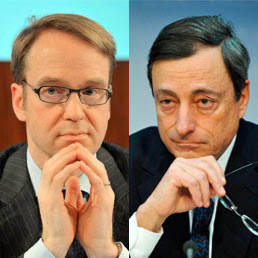Three companions enjoyed a midday meal. The first says,”I’m satiated. The food and drink have done the trick. I’m ready to return to work.”  The second says he still has room for a dessert to top off the wonderful meal. They look to the third, who doesn’t know quite what to do. She did not eat much to begin and needs her energy, but she is too disciplined to have dessert. Â

The ECB meeting has gained extra significance given last week’s developments. The Federal Reserve ended its asset purchase program, which it did not call quantitative easing, but rather credit easing.  It also offered a constructive assessment of the labor market. Its concerns about the decline in inflation expectations, measured by the break-evens, was minimal. There was no recognition of the elevated market volatility in the middle of the month, which had prompted at least one regional Fed president to opine about tapering the tapering. Â
At the end of last week, Japan announced to bold steps that were more aggressive than anyone expected. With cutting its growth and inflation forecasts, the BOJ announced an acceleration of its balance sheet expansion from JPY60-70 trillion to JPY80 trillion, which includes the tripling of equity ETF purchases.  At nearly the same time, the government’s largest pension fund (GPIF with roughly $1.15 trillion of assets) indicated it would diversify its portfolio more aggressively. This involves purchasing more than $150 bln of foreign assets. The government bonds that will be sold are largely made up for by the increase in BOJ purchases. Â
Separately, reports indicate that a somewhat larger than expected supplemental budget is in the works.  Estimates in the press suggest JPY3-4 trillion (0.6%-0.8% of GDP). Some observers see the supplemental budget as a sign that Abe intends to push ahead with the sale tax increase next year.  BOJ and MOF officials seem to agree.  Yet it remains a contested issue. An adviser to Abe suggested postponing the tax until January or April 2017.  Our understanding is that it would require a vote in the Diet, which Abe wants to avoid. The legislative process complicates matters and costs Abe scarce political capital. Â
What it took the Federal Reserve several years to do through its three iterations of asset purchases, the Bank of Japan seeks to do in a year, in terms of balance sheet growth relative to GDP.  After these warm-up acts, the spotlight turns to the European Central Bank. Â
Unlike the Fed and BOJ, which are designed to have a strong leader, the ECB is designed to preserve as much as possible the national interest of its members. At the Fed, when fully staffed, the Board of Governors have a majority of votes on policy. At the ECB, the executive board consists of only six people. According to a Reuters report, Draghi is being accused by many of his colleagues as being Caesar. Draghi is said to have a secretive management style, erratic communication, and weak on collegiality. Â

